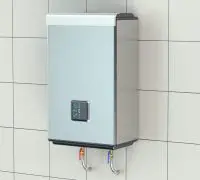If you're looking to fix or replace your Heating or A/C system, we can connect you with a reliable and cost-effective professional in your area.
You need a lot of electricity to heat water in your home. It seems that at least 12% of your house’s energy consumption goes for heating water. One may think that the amount of hot water you need in the home impacts the energy the water heater consumes. Even though it’s not entirely faux, you should know that it also depends on the type of water heater you have installed.
Long story short, if you’re about the get a new water heater and you’re thinking about getting an electric type, go over the pros and cons. It’s going to help you get the complete picture of this sort of tankless water heaters.
Page Table of Contents
What are the positive aspects of electric tankless water heaters?
In all fairness, the electric tankless water heaters are some of the most used choices in terms of home water heating. But you should be an informed customer and get all the pros and cons, especially when you’re also taking a look at a gas water heater.
It goes without saying that many are installing electric tankless water heaters, so there may be a couple of reasons for which they decide to go electric. Without any further ado, let’s see the main good things about electric tankless water heaters:
-
You don’t pay much upfront
If it were to judge only by the initial costs, the electric water heater is the most affordable type by afar. No matter the fuel used for powering the water heater, the kind and size of water heater play a big part in the final price. To give you an example, a regular tank water heater isn’t pricey, whereas the tankless types are going to be pricier upfront. On a general level, the prices between the types of water heaters vary because of the installation costs.
In the case of gas water heaters, you need to install a new ventilation system and to add more piping for venting the exhaust caused by the combustion process. You’re not going to need additional in-home infrastructure with the electric tankless water heater, with the installation process going smoother and more straightforward. In some cases, the house may need an electrical upgrade before installing the electric water heater per se, which may increase the spending for the installation. But it’s not common for an electric water heater to require an upgrade.
-
They are safe
In all fairness, both electric and gas tankless water heaters are safe choices for heating the water in a house. However, we cannot undermine the risk of gas leaks for all appliances running on gasoline. The risk is never null, especially when running on natural gas or propane. Responsible maintenance and inspections of the gas water heater are going to reduce the chances of leaks, nevertheless.
It doesn’t mean that the electric water heaters have no risk whatsoever. They also pose some safety issues, but the chance for a gas leak is higher than the risk for any safety problems with electric water heater.
-
They’re efficient
The energy factors (EF) are the best to tell about the efficiency of different water heaters. The number appreciates how efficient a water heater is at producing hot water since it measures the amount of fuel/electricity is needed for heating water. Once you have the EF numbers, it’s easier to compare the efficiency of every type of water heater. Therefore, the higher the efficiency heater, the higher the EF numbers.
When we take a look at the gas and electric water heaters, it’s the latter that wins the comparison, beyond a doubt. Most gas water heaters present EF numbers ranging from 0.5 to 0.7, whereas the electric water heaters are going to give numbers even higher than 0.9. Nine times out of ten, the gas water heaters lose energy throughout the venting process, whereas the electric water heater doesn’t pose this kind of problem.
-
They’re versatile
With almost all homes connected to the electric grid, it makes sense that electric water heaters also have an available source for electricity. Practically, all homes may rely on using an electric water heater efficiently.
On the contrary, if you have a gas water heater, you need to make sure that your house is linked to a natural gas line. It should at least have a supply source for propane. Should you don’t have either of them, you’re going to have to make the upgrade, which renders the installation process longer and more expensive.
What are the negative aspects of electric tankless water heaters?
Regardless of the many benefits, electric tankless water heaters aren’t the no.1 solution for all homes. There are some negative aspects to consider, as well:
-
No electricity, no hot water
Should a storm or any other event cause a power outage, there will be no more hot water when using an electric water heater. It’s not the case for the gas water heaters, that can operate even when the power goes out.
If that’s a primary concern for you when deciding, you should also make sure that your gas water heater doesn’t require any electricity for running. Even if the electricity may not be the primary source of fuel, some gas water heater still needs an electrical ignition and not a pilot light. In case of a power outage, this type of gas water heaters is just as useless as the electric water heaters.
-
Higher operating costs
It’s evident that the electric water heaters are more efficient than gas water heaters. However, you’re going to pay less when using gas for heating the water supply in your home. It’s the price of the fuel source that gives the difference. Nowadays, natural gas is one of the most affordable sources of energy, with energy being pricier almost every time and everywhere around the world.
Keep in mind that the prices for natural gas and electricity vary from one region to another, which is why you should always make a comparison look before making the final decision. It’s common for utilities to provide financial incentives for installing a water heater, rending it to be a better choice for you.
-
They need a longer time to heat up and to recover
Do you typically wait a lot until the water heats up for a quick shower? In the case of electric water heaters, you’re going to wait even longer than you would with a gas water heater. It’s because the gas combustion process gives heat faster (it can also be twice as fast) than with electric heating.
It’s also common for the gas water heaters to present a high recovery rate. The recovery rate is the amount of water that the heater can heat to a precise temperature in a specific amount of time. A big house with a significant necessity for hot water, the gas water heater may be the better option.
However, when the household doesn’t include many people, the electric water heater may work very well. There’s no need for a high recovery rate for the heater.
Instead of a conclusion- the electric water heaters with solar panels!
If the operating costs are the main reason for which you’re not choosing an electric water heater, you should consider matching it with a solar energy system. When you get solar panels, you can run the water heater off the power of the sun and not buy electricity from the utility company. Solar panels are great for cutting down the spending and even eliminate your electricity bill.
We can definitely connect you with a trusted provider in your area to repair, replace or maintain your heating and A/C systems. Why not let us find a professional for you?






